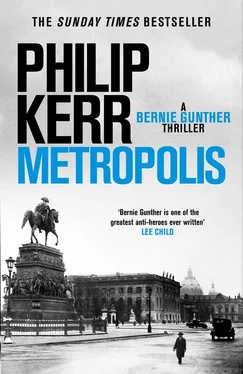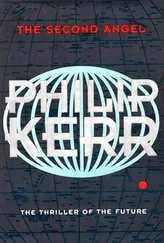Meanwhile, Reichenbach had pursued the Freemason link all the way to the manufacturer in Rosenthaler Strasse, but after interviewing the masters of all three Berlin Grand Lodges, the trail finally went cold — though not before the Nazi Party unilaterally decided in the pages of Der Angriff that the link with freemasonry was all too real and only proved what it had always argued: that freemasonry was an insidious cult that threatened to undermine Germany and should be outlawed. Since it was generally known there were many Freemasons employed as policemen at the Alex, the Nazi theory provided the Party with yet another means of criticizing the Berlin police.
We were an easy target, of course, not least because Berlin now had almost nothing in common with the rest of the country. Increasingly the capital city was like a large ship that had slipped its mooring and was slowly drifting further and further away from the coast of Germany; it seemed unlikely we were going to return to its more conservative ways, even if we’d wanted to. It’s not just people who outgrow their parents and origins; it’s metropolises, too. I’d read that a lot of Franzis hated Paris for much the same reasons: Parisians always made them feel like poor relations. Maybe it’s the same with any great metropolis; for all I know the people of Mexico hate the citizens of Mexico City for the very same reasons that Berliners are despised by the citizens of Munich. And vice versa, of course; I’ve never been particularly fond of Bavarians.
Helen Strauch’s case was life in the metropolis writ horribly, swinishly large, squalid and depressing, like lifting a wet stone in a very dark forest to see what was crawling underneath, and when I finished reading the file I felt obliged to wash my hands and face; but my evening was just beginning and there were many more unpleasant things about to come crawling my way.
I knew we were probably in the right place when, approaching the Fischerstrasse bridge at the end of Friedrichsgracht, I recognized the uniformed policeman seated on a mooring bollard; his name was Miczek and he was a good copper who could usually be relied on. The shine on his boots would have told you that much: Miczek was a real spit-and-polish copper and as tough as his steel toe caps. Seeing the murder wagon, he stood up, buttoned his tunic collar, replaced the fire bucket of a leather helmet on his head, tossed his cigarette into the black water behind him, and approached with a two-finger salute. It was the wagon that drew the respect, not me, even though I was now nominally in charge of the homicide.
‘Where’s our Max Mustermann?’ asked Hans Gross, climbing out from behind the wagon’s enormous steering wheel. Along with the two uniformed policemen who’d accompanied him from the Alex, I followed. Our stenographer, Frau Künstler, stayed put behind her typewriter; she had no appetite for seeing a dead body, and I couldn’t say I blamed her. Especially not a body that had been in the river. The haze of cigarette smoke in front of her bespectacled face was probably there to make sure she didn’t see or smell anything unpleasant.
‘Still in the water,’ said Miczek. ‘We’ve hooked him but didn’t want to pull him out in case we lost any evidence.’
Bodies were frequently found floating in the Spree and just as often remained unidentified. When a corpse was being manhandled onto the quayside it was easy for a wallet or a purse to fall out of a pocket and sink to the bottom of the river. After that it was surprisingly difficult to put a name to a human face, especially if the fish had already lunched there.
‘Good work,’ said Gross.
Miczek pointed down at three bargemen who were playing skat on top of an upturned fish basket. All had caps, pipes and enough facial hair to stuff a small sofa.
‘Come to see our catch, have you?’ said one, and reaching behind him, he pulled on a length of line that brought closer to the oily surface of the water the upper part of a man’s body.
Meanwhile, Hans Gross had already unfolded his portable Voigtländer and was taking pictures.
‘Who found him?’ I asked.
‘Me,’ said the man holding the line. ‘Spotted him just after lunch.’
Half an hour later we had landed him on the quayside and a small crowd of bystanders started to gather. The man didn’t look as if he’d been in the water for very long. He was about fifty, with a small moustache that resembled a smudge on his upper lip. He was wearing a double-breasted, pinstriped suit, and a pair of shoes that already told me he wasn’t a bargee. On his lapel was an Iron Cross. And in his chest, right up to the hilt, was the knife that had killed him.
‘Anyone recognize this fellow?’ I asked.
No one said a thing. I touched the handle of the knife and found it was lodged so firmly in the dead man’s chest it must have gone all the way through into his backbone. As he lay there, his mouth slowly sagged open and, much to everyone’s horror, a small crayfish came wandering out, almost nonchalantly. Restraining my own disgust, I searched the man’s pockets, which were empty save for one thing: a plain wooden ball a little smaller than a tennis ball. I looked at it without much comprehension. I was thinking I might have encountered a real mystery of the kind that are supposed to fascinate good detectives when I heard a voice and realized that the discovery of the wooden ball had prompted a response from someone in the growing crowd.
‘I reckon that’s Bruno Kleiber,’ said a woman. She was wearing a cotton smock and a man’s old army cap, and she carried a broom. Her legs were so heavily covered with varicose veins they looked as if several small sea creatures had burrowed underneath her skin. And from the angle of her head on her shoulders I supposed there was something wrong with her spine. She spoke in a Berlin accent that was as thick as her forearms.
‘Let her through,’ I told the constable, and the woman stepped forward.
‘You are?’
The woman snatched off her army cap to reveal a head that was so deeply scored with an old bullet wound it almost resembled a centre parting and looked like the very definition of a lucky escape. ‘Dora Hauptmann, sir. I sweep the quays clean. For the Cölln Canal Company. Everywhere on this island, sir, south of Schlossplatz.’
‘And you think you recognize the dead man?’
‘Wasn’t sure of it until I saw that ball in his pocket. But now I am. No mistaking that wooden ball and that Iron Cross. His name is Bruno Kleiber and that wooden ball was his living for ten years, I reckon.’ She took out a handkerchief, dabbed at the corner of each rheumy eye, and then pointed west along Friedrichsgracht. ‘I can show you where he worked, if you like.’
‘Thanks. I’d appreciate it.’
We started along the quayside.
‘Three-shell game was it?’ I asked. ‘Kleiber’s racket?’
‘Nah. Ball’s too big. He used to run a street roulette wheel underneath the Gertrauden Bridge. Every morning, at exactly nine thirty a.m., he’d open up his table and start the ball rolling. That’s when everyone who works at the Cölln Fish Market finishes for the day. They go and get a few beers in, or maybe a whore who doesn’t mind the smell of fish so much, and sometimes they’ll stop to make a bet at Kleiber’s table. Little Monte Carlo they call it. An illegal game, of course, but it didn’t do any harm and the game wasn’t crooked, neither. Kleiber didn’t need to be crooked. Ran a straight game, everyone knew that. That Iron Cross he wore was supposed to be a guarantee of his integrity and it was. He made just enough money to make it worthwhile for himself but not so much that folk around here ever resented him. He always paid up when he lost, which is how he stayed in business for so long.’
Читать дальше












